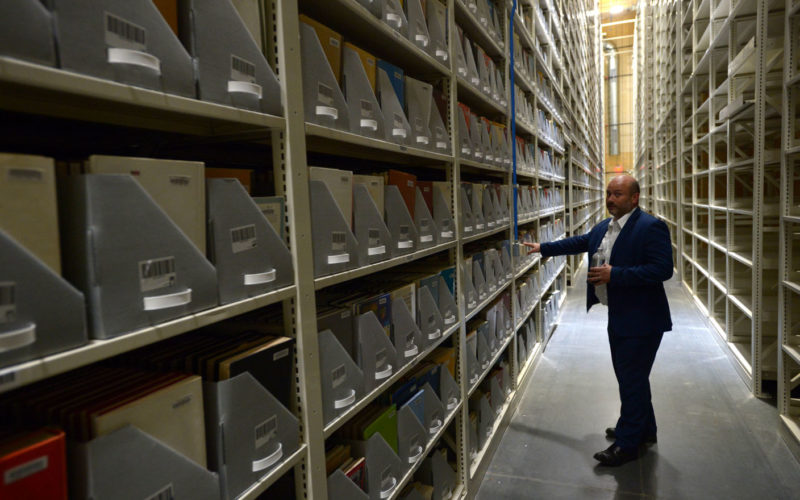Petition questions removal of printed materials at UA library
Jaime Adame
Special to The Free Weekly
The proper place for books in the main library at the University of Arkansas remains a tricky topic among at least some faculty members after an email from a UA librarian questioned the removal of most printed materials and putting them in storage.
More than three-quarters of the 1.2 million books and other bound printed materials previously at Mullins Library are being moved to an off-campus storage facility, according to statements from library officials.
Books began to be moved June 11 from Mullins Library into the newly built storage facility, Kelsey Lovewell Lippard, public relations coordinator for UA libraries, said last month.
Officials say the books are moving because the library needs more student study areas. They also cite broader usage of digital holdings and a decline in the number of books and other materials being checked out.
At UA, library materials checked out in 2016-17 totaled 31,320 across all UA libraries, down by about 49 percent from 60,964 in 2012-13.
Jozef Laincz, in his final week working as a UA librarian, began an online petition and sent an email blast to faculty members asking them to “save Mullins library.” The petition, addressed to Chancellor Joe Steinmetz, had more than 430 signatures, though it’s unclear how many who signed have ties to the university.
Laincz, in the email he sent last week, also asked people interested in the library to meet to discuss the topic. About 25 people attended the campus meeting. Most were librarians who spoke about why removing books made sense given issues like library crowding in days leading up to finals.
However, Laincz said at the meeting he felt the decision to remove the books was made without properly communicating with faculty members, and he talked about how at other schools, in particular the University of Texas at Austin, the campus has rallied to oppose the removal of library books.
“Do we need the library? Is browsing important for scholarship? That’s the only question we need to ask,” Laincz said.
Others said books will remain accessible, with staff members making multiple trips daily between the campus and the new $11.4 million off-campus storage facility.
Among the fewer than 10 non-librarians at the meeting was Brett Sterling, an assistant professor of German.
By phone, Sterling said he walked into the meeting “concerned about the browsing ability in the library, the importance of that for research and teaching.”
Browsing the shelves helps when he’s researching some 1,000 years of German history, he said.
He said he still thinks browsing is important, but after the meeting he feels he “can live with” the changes.
“I’m hoping the change will be a net positive for the university,” Sterling said.
In an email, Randall Woods, a UA history professor and a former dean of the university’s arts and sciences college, said he and other faculty members previously “expressed strong reservations about the dispersal of books from Mullins Library, but the decision has been made.”
By phone, Woods, who was not at the meeting, said the decision to remove the books is “more a matter of inconvenience, shall I say, than anything else.”
At the meeting, retired history professor Evan Burr Bukey likened the removal of books to taking the library’s “heart out.”
Cassia Oliveira, an associate professor of biology at Lyon College in Batesville, said in an email she received her doctorate from UA in 2008, then worked for two years as a postdoctoral researcher at UA.
“During my seven years at UofA, I spent countless hours at the Mullins library working on assignments and writing my PhD dissertation. I understand that libraries should modernize to meet the needs of twenty first century users, but the Mullins library is a reference library to thousands of people.” Oliveira signed the petition.
The petition states 86 percent of the collection is being removed to storage, but totals have not been finalized, said Kathleen Lehman, head of user services for UA libraries and the 2018-19 chairman of the university’s faculty senate.

NWA Democrat-Gazette/ANDY SHUPE
Palash Shah, a project engineer for Con-Real, leads a tour Friday, June 29, 2018, of a storage facility being constructed by the University of Arkansas for the storage of library materials south of Martin Luther King Jr. Boulevard in Fayetteville. The proper place for books in a space-starved library at the University of Arkansas, Fayetteville has become the subject of some debate after an email sent to faculty by an outgoing librarian urging them to fight against changes that are removing roughly two-thirds of printed materials.
In an email, Lehman said out of “the approximately 1.2 million (1,188,960) monographs and printed serials in the Mullins collection, about 200,000 items will be staying in the main library,” which amounts to about 83 percent of those type of materials being removed.
The petition also refers to UA having smaller library holdings than similar research universities, but librarians at the meeting questioned that.
Mark Rushing, a UA spokesman, said in an email the petition has “many inaccuracies,” with UA “actually expanding its capacity while continuing to grow its print collection.”
He added: “University Libraries has worked with representatives from across campus for many years to develop its plan that better supports interdisciplinary and collaborative research needs of faculty and students and the growing availability of digital resources, similar to those of many other top university libraries.”
Laincz said by phone that he was a tenure-track librarian not reappointed by UA. His last official day of employment was June 30. He said he plans to fly to his home country of Slovakia and will seek to continue his career in libraries in Europe.
Laincz said he would like others to take up the cause of keeping books in Mullins Library.
“I don’t know whether this will be effective or not, whether it will make the administration at least increase the number of books that are on-site,” Laincz said, adding that “any 100,000” more books kept on-site would allow for increased browsing of the shelves.
He said he wants the UA community to pull together “and take our destiny in our hands a little bit, so I think this will be very positive if it has that kind of rallying effect.”






